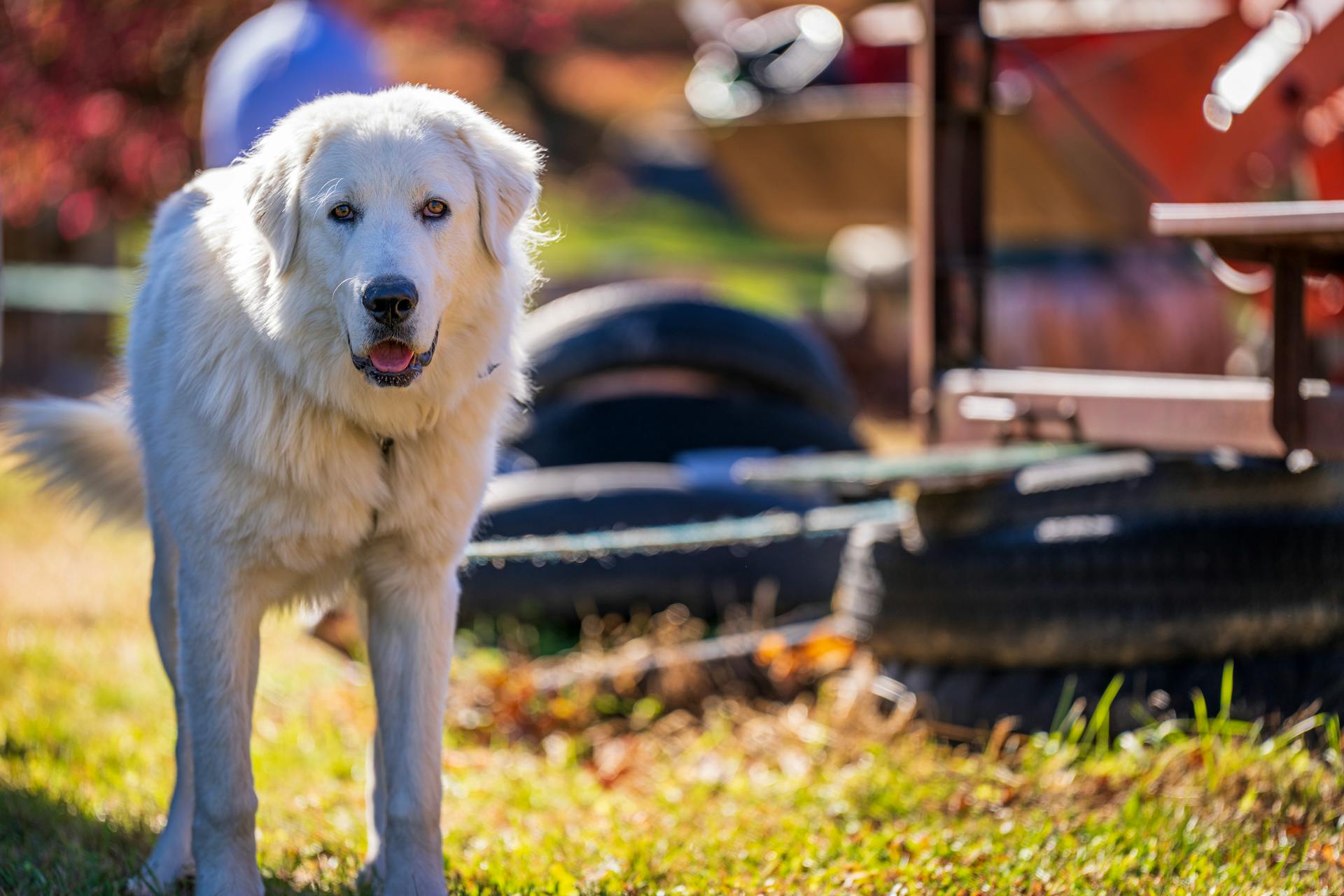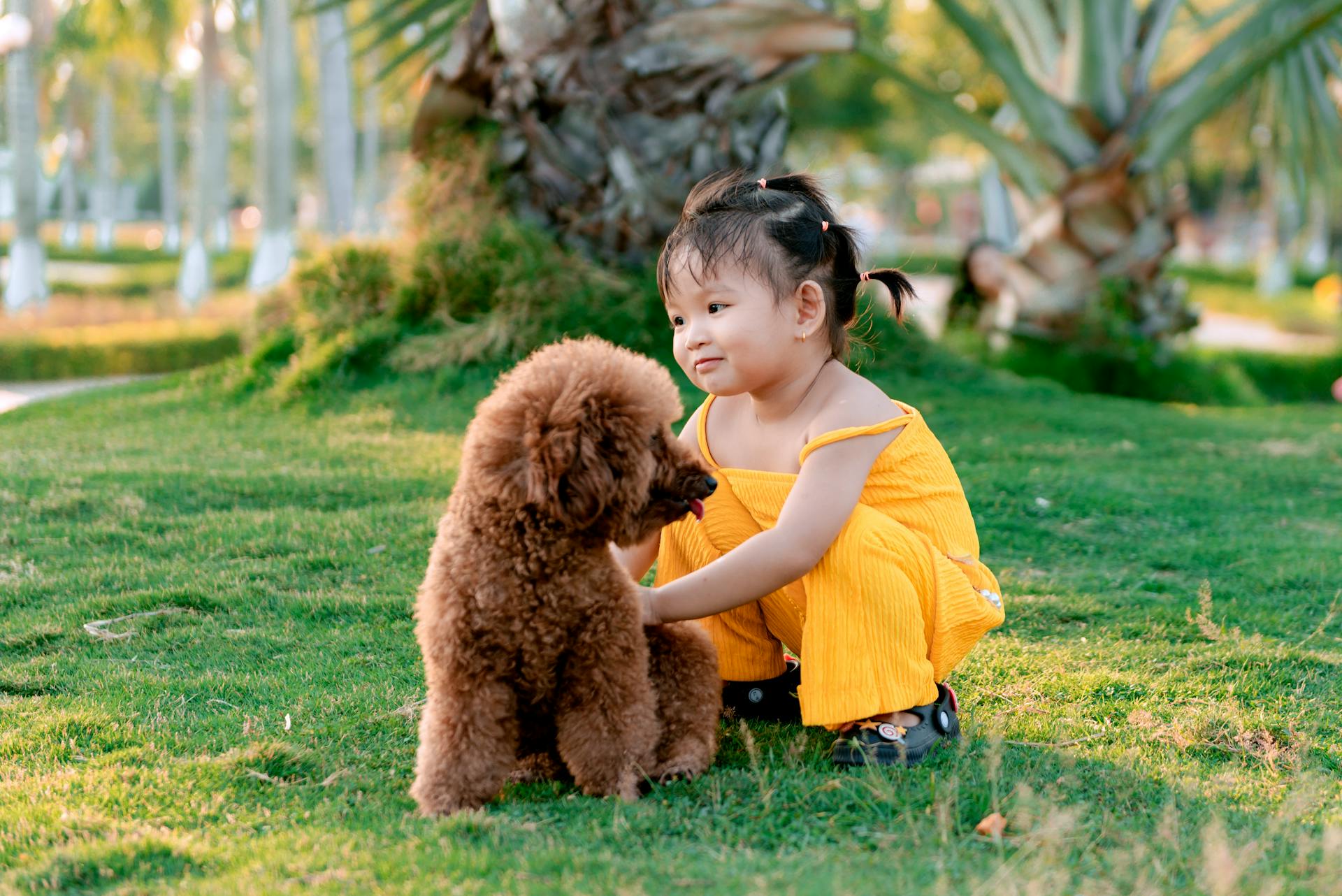
As a Great Pyrenees owner, you want to ensure your furry friend's ears stay healthy and happy. Regular ear cleaning is crucial to prevent wax buildup and infections.
The Great Pyrenees' ears are known to be prone to ear infections due to their floppy ears, which can trap moisture and create a warm, humid environment.
Cleaning your Great Pyrenees' ears should be done carefully to avoid pushing wax further into the ear canal. Use a gentle ear cleaner and cotton balls to clean the outer ear area.
Readers also liked: German Sheperd Ears
Cleaning Great Pyrenees Ears
You should clean your Great Pyrenees' ears every 1-2 weeks to prevent wax and moisture buildup. Regular ear cleaning will help prevent infections and maintain overall ear health.
To start, gather necessary supplies like a dog-specific ear cleaning solution, cotton balls or soft gauze, and treats for rewarding your dog. It's also essential to create a calm environment, choosing a quiet and comfortable area to keep your dog relaxed.
Inspect the ears first for signs of infection like redness, swelling, or an unusual smell. If you notice any of these signs, consult a veterinarian.
To clean your Great Pyrenees' ears, apply ear cleaning solution into the ear canal, taking care not to insert the bottle tip too deeply. Then, massage the base of the ear for a few seconds to help loosen wax and debris.
After cleaning, allow your dog to shake its head to loosen the debris inside the ear canal. Finally, wipe the ear with a cotton ball or gauze, focusing on the visible parts of the ear canal and the ear flap.
Some ear cleaners contain harsh chemicals or alcohol that can irritate your dog's sensitive skin. Instead, use a high-quality, dog-specific ear cleaning solution that's gentle on your Great Pyrenees' ears.
If you're unsure about the best ear cleaner for your dog, consult with your veterinarian for a recommendation. They can help you choose the most suitable ear cleaner for your Great Pyrenees.
Here are some tips to keep in mind when cleaning your Great Pyrenees' ears:
- Use cotton balls or soft gauze to wipe the ear, avoiding the use of cotton swabs or Q-tips that can push wax and debris further into the ear canal.
- Clean both ears thoroughly, making sure to inspect and clean the visible parts of the ear canal and the ear flap.
- Reward your dog with treats after cleaning each ear to create a positive experience.
- Be patient and gentle when handling your Great Pyrenees' ears, especially if they're resistant to ear cleaning.
Great Pyrenees are more prone to ear problems due to their large, floppy ears that trap moisture and reduce air circulation. Regular ear cleaning and monitoring can help prevent these issues and maintain overall ear health.
Ear Health and Hygiene
Great Pyrenees ears can be prone to problems due to their large, floppy ears that trap moisture and reduce air circulation, creating an environment conducive to infections.
Regular ear cleaning is essential in preventing these issues and maintaining overall ear health. You should clean your Great Pyrenees' ears regularly to prevent infections and blockages.
Using a gentle, hypoallergenic ear cleaning solution recommended by your veterinarian is best for Great Pyrenees with sensitive ears. These solutions are specifically formulated for dogs with sensitive skin and are less likely to cause irritation.
Ear cleaning alone cannot prevent all causes of hearing loss, such as genetic factors or age-related changes. However, regular ear cleaning can help prevent conditions that might lead to hearing loss, such as chronic infections or blockages in the ear canal.
Regular ear cleaning can help prevent conditions that might affect your Great Pyrenees' balance, such as inner ear infections. By keeping the ears clean and free from excessive wax and debris, you reduce the risk of infections and blockages that can impair balance.
A unique perspective: Lab Dog Ears
Preventing Ear Problems
Regular ear cleaning is a crucial part of maintaining your Great Pyrenees' ear health. By keeping their ears clean and free from excessive wax and debris, you reduce the risk of infections and blockages that can impair balance.
Consistent ear care can prevent conditions that might lead to hearing loss, such as chronic infections or blockages in the ear canal. This is especially important for Great Pyrenees, as they are prone to these issues.
A poor grooming routine can lead to chronic ear problems in Great Pyrenees. Neglecting ear care can result in the buildup of wax and debris, leading to infections and other complications.
Regular veterinary check-ups are essential in maintaining your dog's ear health and hearing. This will help catch any potential issues early on and prevent more serious problems from developing.
Worth a look: Great Pyrenees Common Health Problems
Identifying and Addressing Issues
If your Great Pyrenees shows signs of discomfort or stress during ear cleaning, such as whining, trying to move away, or pawing at their ears, it's essential to approach ear cleaning gently and make it a positive experience.
Use treats and praise to create a calm environment, and consider consulting a professional trainer for advice on making the experience more comfortable.
Regular ear inspections during cleaning can help in early detection of potential issues, so be sure to inspect your dog's ears regularly for signs of infection like redness, swelling, or an unusual smell.
Some signs of an ear infection in a Great Pyrenees include redness, swelling, a strong unpleasant odor, discharge, and behaviors indicating discomfort. If you observe any of these symptoms, consult your veterinarian for proper diagnosis and treatment.
Great Pyrenees are more prone to ear problems than breeds with erect ears due to their large, floppy ears, which can trap moisture and reduce air circulation, creating an environment conducive to infections.
Here's an interesting read: Vinegar and Water for Dogs Ears
Identifying Dog Infections
A strong unpleasant odor is one of the signs of an ear infection in dogs.
Redness and swelling around the ears are also common indicators of an ear infection.
Discharge and scratching the ear are other behaviors that can indicate discomfort due to an ear infection.
Shaking the head or whining can also be signs of an ear infection.
Changes in a dog's balance or hearing can be a sign of a severe ear infection.
Great Pyrenees are more prone to ear problems due to their large, floppy ears.
Their ear shape can trap moisture and reduce air circulation, creating an environment conducive to infections.
Regular ear cleaning and monitoring are essential in preventing ear problems and maintaining overall ear health.
Curious to learn more? Check out: Great Pyrenees Behavior Problems
Identifying Dislikes in My Pyrenees
If your Great Pyrenees dislikes ear cleaning, they might show signs of discomfort or stress, such as whining, trying to move away, or pawing at their ears.
It's essential to approach ear cleaning gently and make it a positive experience for your dog. Use treats and praise to create a calm environment.
If your dog consistently shows discomfort, consider consulting a professional trainer for advice on making the experience more comfortable.
Some common signs of ear discomfort in Great Pyrenees include redness, swelling, or an unusual smell in the ears. If you notice any of these signs, consult a veterinarian.
A calm and quiet environment can help your dog feel more at ease during ear cleaning. Choose a quiet area and make sure your dog is comfortable before starting the process.
Here are some common signs of ear discomfort in Great Pyrenees:
- Whining
- Trying to move away
- Pawing at their ears
Frequently Asked Questions
What does a purebred Great Pyrenees look like?
A purebred Great Pyrenees has a distinctive appearance with a rounded head, small to medium V-shaped ears, and almond-shaped dark brown eyes. Its thick, feathery coat and long tail complete its majestic and gentle-looking profile.
Sources
- https://brownvethospital.com/blog/great-pyrenees-dogs/
- http://greatpyrenees.club/grooming-the-great-pyrenees/
- https://showsightmagazine.com/elegance-in-the-great-pyrenees-head/
- https://iheartdogs.com/11-ways-to-treat-prevent-ear-infections-in-great-pyrenees/
- https://iheartdogs.com/how-to-clean-a-great-pyrenees-ears/
Featured Images: pexels.com


